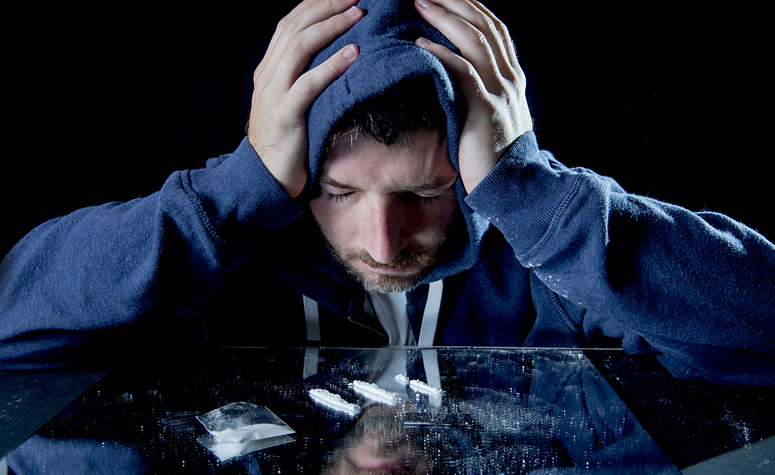Cocaine Detox:
Withdrawal Symptoms, Timeline and Methods
Moving towards a life without cocaine might seem like a daunting task if you’ve become heavily reliant on it. However, stepping into a drug-free existence is not just a possibility but a reality with the right approach to detoxification.
Cocaine, a potent stimulant that users often snort, inject, or smoke, becomes hard to quit due to its addictive properties and the withdrawal symptoms it triggers.
The decision to stop using cocaine can bring about a series of withdrawal symptoms such as exhaustion, disrupted sleep patterns, and a sense of agitation. These symptoms represent significant challenges for individuals aiming to quit the substance, as the urge to consume cocaine becomes particularly strong during the detox period, often leading to a risk of relapse.
The effort to quit cocaine without support tends to be unsuccessful for many, as the physical discomfort and cravings during withdrawal are underestimated. However, with the assistance of medical supervision and continuous monitoring, it’s possible to safely remove the substance from one’s system, thereby setting a foundation for both bodily and mental recovery.
The complete detox process might span from a few days to a couple of weeks, so immediate changes might not be noticeable. At AddictionRehab, we offer the encouragement and tools necessary to support your detox journey, ensuring continued guidance towards recovery.

Why is Detox Required to Come off Cocaine?
Engaging with cocaine, much like other substances that can be habit-forming, carries the risk of significantly disrupting lives and breaking family ties. Those embroiled in addiction may find themselves unable to view their circumstances with the clarity they once had. Hence, undergoing a detox from cocaine is crucial for restoring mental clarity and focus that was lost due to the substance’s misuse.
The highly addictive nature of cocaine means that individuals attempting to cease its use are likely to face intense cravings and a compelling urge to consume the drug once more. The purpose of detox is to help individuals overcome their physical dependence, offering them a period to restore their fortitude so that they do not depend on cocaine for everyday functionality. However, it’s important to note that recovery is not instant, the body needs time to adjust as it eliminates cocaine during the detox period.

Sometimes the smallest step in the right direction
ends up being the biggest step of your life
Tiptoe if you must, but take the step
Cocaine Withdrawal Symptoms
The process of withdrawal can be so intense that it might drive individuals to start using again, just to escape the severe discomfort and distress withdrawal brings.
Withdrawal presents itself as a deeply individual experience, with its impact varying widely from person to person. During the detoxification process, you may find yourself facing several symptoms related to withdrawing from cocaine, such as:
- Feeling anxious
- Becoming easily annoyed or irritated
- Experiencing feelings of depression
- Having trouble focusing
- Noticing slower thought processes and physical movements
- Suffering from fatigue
- Seeing changes in your sleeping habits, such as sleeping more than usual
- Noticing an increased hunger
- Having a strong longing for cocaine
- Experiencing feelings of suspicion or paranoia
While the process of withdrawing from stimulants typically doesn’t lead to serious physical symptoms (nor is it directly hazardous to one’s health), there are instances where some individuals might undergo an intense period of dysphoria, filled with negative thoughts and emotions. This intense feeling of dysphoria can, in rare cases, be linked to thoughts or attempts of suicide, and may also lead to a relapse into using cocaine.
Most symptoms related to withdrawing from cocaine start to improve a few days after stopping. However, some individuals might face a longer battle, continuing to deal with significant symptoms for weeks. This prolonged period of withdrawal, also identified as Post-Acute Withdrawal Syndrome (PAWS), is characterised by the continuation of certain withdrawal symptoms much longer than normally expected after stopping the drug use.
The severity of withdrawal symptoms can differ significantly from person to person, influenced by several factors such as their age, overall health, how much cocaine was used, and the length of usage. Other factors to consider include how the cocaine was consumed and whether other substances were used alongside it.
Your experience with withdrawal is entirely unique to you. Factors such as your health, mental state, history of addiction, the amount used, genetic factors, and biology will shape how you experience and progress through withdrawal. Generally, this process is not considered life-threatening. Engaging in a professional detox programme offers you the medical oversight and support you need, ensuring your safety from the risk of relapse during this challenging period – a common concern for those trying to manage the symptoms by themselves.

What Causes Cocaine Withdrawal Symptoms?
Withdrawal from cocaine often occurs in individuals who have formed a dependency on the stimulant. This condition develops after prolonged usage, making the individual rely on the substance for their usual functioning.
The speed at which a person becomes dependent on cocaine after their initial encounter with the drug can vary significantly from one individual to another, with genetics possibly playing a pivotal role in this rapid development of dependency.
The essence of cocaine dependency and the subsequent withdrawal symptoms can be attributed to the drug’s influence on the brain’s dopamine neurotransmission. Cocaine use markedly increases the levels of dopamine, a key neurotransmitter in brain areas related to motivation and pleasure.
The surge in dopamine levels due to cocaine consumption strongly encourages the continued use of the substance. Nonetheless, with ongoing use, the brain begins to adjust to the increased presence of dopamine, becoming progressively less receptive to the effects of cocaine. This leads to the need for higher doses of cocaine to prevent withdrawal signs like depression and insomnia.
Furthermore, cocaine is identified as possessing a “rapid addiction risk,” meaning the duration it takes for an individual to develop a dependence on cocaine after beginning use is quicker than that for many other substances.
How Long do Cocaine Withdrawal Symptoms Last?
Individuals deciding to confront their addiction and begin recovery deserve commendation for this brave choice, yet they should also prepare for a period that demands patience. The reaction to cocaine detoxification varies from one individual to another, which is why it’s critical that your treatment programme is customised to meet your unique needs. Our team at AddictionRehab is dedicated to ensuring your treatment plan is precisely adjusted for you.
Withdrawal symptoms from cocaine can start at different times based on the specific form of cocaine used. Regular use of crack cocaine, for instance, tends to trigger withdrawal symptoms more quickly, often within a few hours after the last consumption. Generally, the primary withdrawal symptoms from cocaine may continue for approximately 3-4 days, yet in some individuals, certain symptoms may remain for up to 3-4 weeks.
The intensity and duration of these extended or severe symptoms vary among individuals. Studies looking into the recovery of people addicted to cocaine indicate that there was no significant change in impulse control even after four weeks without use.
The presence of severe withdrawal symptoms could lead to a higher chance of returning to cocaine use. Studies have demonstrated that individuals who exhibit higher levels of severity in their cocaine withdrawal symptoms are considerably more likely to revert back to using cocaine than those with milder symptoms. Through medical oversight, cocaine withdrawal is managed with both medical care and community support, aiming for a secure and tolerable period of withdrawal, thereby reducing the risk of relapse.
Detoxing from cocaine varies greatly between individuals, highlighting the importance of a general understanding of the detox timeline to offer insight into what might be expected. This guideline isn’t rigid but rather provides a framework to help understand the detox journey more clearly. Everyone’s path to recovery is distinct, influenced by their personal health and the specifics of their cocaine use. Here is an overview of what one might typically experience during the detox process, emphasising that moving forward in recovery is crucial, irrespective of how long it takes.
- Week 1
The initial week can be particularly tough, characterised by a range of mood-related symptoms, a strong desire for the drug, feeling easily annoyed, difficulties in sleeping, and a significant urge to use the drug again due to the intense nature of these withdrawal symptoms. - Week 2-10
As time progresses, the severity of symptoms lessens, though the desire for cocaine persists. Individuals might still face challenges with mood swings and focusing. - Week 10+
By the tenth week, most intense symptoms should have significantly reduced or disappeared. However, unexpected urges to use the drug might still occur due to specific situational triggers.
It’s important to view this timeline as a flexible guide rather than an absolute timetable. The detox experience can vary widely, affected by personal health, the degree of cocaine use, and individual resilience. Recovery is an individual journey, not a contest. It’s crucial to celebrate each step towards a drug-free life, recognising that setbacks are a normal aspect of the recovery process.
Coming across challenges is usual, particularly when attempting a detox by oneself or without medical guidance. Often, individuals need multiple detox attempts before they achieve and maintain recovery. The focus should be on perseverance and finding the proper support to guide you successfully through the detox.

Fast Access to Residential Treatment
We are currently able to offer fast access to private inpatient treatment. Please call us today and speak to one of our expert advisors.
Call in confidence: 0800 0148 970
Methods to Detox from Cocaine
Detox from cocaine can take the from of either a home-detox or inpatient medically supervised detox which is the safest option.
Home detox
Cocaine is one of those rare drugs that individuals can decide to stop using all of a sudden, a method commonly referred to as “cold turkey.” However, choosing to go through this process without any support might not be the best idea.
Despite extensive research into the withdrawal effects of cocaine, experts have not yet pinpointed a method for gradually decreasing use through either the substance itself or an alternative. This leaves “cold turkey” as the only option for detox. People facing this choice can either go through the process alone or seek the support of a drug rehabilitation centre. Choosing to detox in a clinical environment is recommended as the most reliable method, enabling immediate management of withdrawal symptoms and thus, reducing the temptation to relapse.
Home detox introduces several challenges that are not encountered in a professional setting. At AddictionRehab, we provide residential treatment that includes constant supervision by healthcare professionals, ensuring a safe and effective detox process. For those for whom residential treatment isn’t an option, we also offer outpatient services.
One of the main issues with trying to detox at home is the choice many make to quit using cocaine abruptly. Stopping all of a sudden, rather than tapering off the drug, can lead to very intense withdrawal symptoms appearing more quickly, which can negatively affect both the detox process and overall recovery.
In some rare cases, trying to detox without any supervision could be deadly, especially if other substances like heroin or alcohol are also being used. Besides this risk, stopping drug use might also reveal mental health issues that were hidden by the drug use. For example, depression might emerge and lead to thoughts of harming oneself.
To avoid these dangerous situations, it’s vital to consider undergoing a detox from cocaine that’s supervised by medical professionals. Before you decide to detox at home, think about the following:
- You won’t have access to professional counselling or mental health support as you try to stop using cocaine
- Without someone to monitor your health, you’re at greater risk for complications
- Withdrawal symptoms can be tough, which could make it more likely for you to start using cocaine again in a home setting

Inpatient detox
Commonly, being admitted for detox is seen as the safest way to withdraw from cocaine because clients are under constant medical care both physically and mentally. This is because patients get 24-hour health care, making sure their health is watched over as they get the drug out of their system.
This kind of detox is also more successful in helping with recovery. It supports both the body and mind in getting over addiction to cocaine. After you finish a detox plan and are ready to move forward, you’ll start a full treatment for cocaine use. This includes different kinds of therapy to deal with the deep-seated reasons for your addiction, aiming to cut the need to use cocaine again.

Sometimes the smallest step in the right direction
ends up being the biggest step of your life
Tiptoe if you must, but take the step
Cocaine Withdrawal Medications
Currently, no specific medicines are sanctioned for the direct treatment of stimulant withdrawal. Research into the potential benefits of drugs such as modafinil and amantadine in managing symptoms associated with cocaine withdrawal has been carried out. Yet, to date, these substances have not been officially approved.
Within a withdrawal management plan, a patient’s care team may utilise a variety of medicines to alleviate symptoms like headaches and sleeplessness, aiming to ensure the patient’s comfort during the initial phase of recovery. The search for effective drug-based treatments continues, with efforts focused on finding ways to address various substance use issues, stimulant disorders included.
When undergoing detox, it’s possible for healthcare professionals to recommend medication to assist in the process. Depending on the individual symptoms presented during withdrawal from cocaine, a selection of treatments is available to reduce these symptoms, aiding individuals to focus on their recovery. Frequently recommended treatments include:
- Antidepressants
It’s common to experience depression during the withdrawal phase, which may lead to the prescribing of antidepressants, for instance, sertraline (Zoloft). - Anti-anxiety medications
For those experiencing heightened anxiety, a prescription for a benzodiazepine could be given. It’s important to be mindful of their addictive potential. - Sleep aids
Following the cessation of cocaine, many encounter insomnia. Melatonin, an over-the-counter option, could be suggested to help stabilise sleep patterns, with the approach customised by the medical professional. - Secondary symptom assistance
To ensure individuals are comfortable, medical staff may administer treatments for less severe side effects of withdrawal, including nausea, headache, and muscle discomfort, through over-the-counter medicines. - Medications for other substance addictions
Cocaine addiction often occurs alongside dependency on other substances, necessitating personalised treatment approaches. For individuals also battling alcohol dependency, disulfiram might be prescribed as a preventive measure. In the case of opiate addiction, which frequently coincides with cocaine abuse, methadone could be utilised to help control cravings and support ongoing recovery efforts.
The Benefits of Medical Detox for Cocaine
Withdrawal from cocaine, while not always as immediately severe or dangerous as withdrawals from some substances like alcohol or opioids, can still be highly uncomfortable. In the worst cases, withdrawing from cocaine can lead to serious mental health issues, including depression or a condition known as withdrawal dysphoria.
Having access to a safe detox environment, where healthcare experts monitor and manage symptoms, is critical for successfully moving through this initial phase of recovery. Even though relapses can happen at any stage of recovery, immediate care from health professionals during detox can be crucial in helping an individual recover and stay on their path to recovery.
Medical management of withdrawal involves three key components designed to benefit the patient and ensure a safe and effective process of detoxification.
These components are:
Evaluation
The detox service provider conducts a detailed examination of the patient’s current health, assesses their support network, and identifies the most suitable interventions for the patient post-detox. This comprehensive evaluation ensures the detoxification process is specifically tailored to meet the individual’s needs, improving the chances of successful treatment outcomes.
Stabilisation
The aim here is to assist patients in reaching a state of not using the drug and medical stability. This stage is vital in helping individuals move from dependence to a position where they are physically stable and ready to proceed to the next phase of recovery without the intense physical cravings or discomfort associated with the initial phase of withdrawal.
Fostering a patient’s entry into treatment
The goal of withdrawal management should also include preparing patients for further treatment, addressing the psychological, social, and behavioral issues related to their substance dependency.

Why trust AddictionRehab with your detox?
Choosing AddictionRehab for your cocaine detox means you’re in safe hands. Our dedication is towards ensuring your detoxification process is as smooth and comfortable as can be. Here’s why you should consider us for your journey:
- Professionally supervised 24/7 care
Our continuous monitoring and customised treatment plans, part of our comprehensive detox and rehabilitation offerings, ensure your well-being and comfort at every step.
- Your comfort is our priority
Given the energising effects of cocaine, it’s normal to feel unusually tired when you stop using it. We have specific techniques included in your detox plan to help manage these changes, making sure that your transition is smoother.
- A holistic approach to restoring the whole of you
We believe in treating the whole person – your mental, physical, and spiritual health are all considered in our care approach. This holistic strategy doesn’t just offer a quick fix but promotes overall health and lasting recovery.
- High quality nutrition
Our private centres offer nutritionally balanced meals prepared by experienced chefs using top-quality ingredients, aimed at restoring your strength as you detox from cocaine.
- Workshops designed to keep you focussed
Engaging workshops and sessions are organised to keep you focused and motivated during your detox journey.
- Compassion from staff who have been exactly where you are
The unique insight and empathy of our staff, who have personal recovery experiences, provide exceptional support and understanding throughout your detox.
- Aftercare to support your recovery for life
With our aftercare services, the support you receive doesn’t just end when you leave our facility. You’ll have access to a supportive community for life, ready to offer assistance and guidance whenever needed.
The Long Term Benefits of Detoxing from Cocaine
Once you’ve successfully completed a detox from cocaine, the path to recovery becomes significantly smoother. With the drug eliminated from your body, you gain a clear perspective on your goals and ambitions.
Here are some of the benefits you can look forward to:
Enhanced mental well-being
Boosted physical health
Stronger relationships
Improved performance in work or education
The journey of detox and withdrawal is just the beginning. Making the courageous decision to quit and enduring the detoxification process not only sets you up for success in your immediate future but also empowers you with the resilience and determination needed for long-term achievements. Overcoming the challenge of cocaine dependency strengthens you, preparing you for a fulfilling life ahead.
Your Next Steps
No matter your stage in dealing with cocaine, remember it’s always the right moment to start planning your route to recovery. Our professionals at AddictionRehab are thoroughly experienced in every aspect of addiction management. Although it’s ultimately up to you to decide to get better, we’re here to offer the necessary expertise and advice on tackling the detox journey.
We believe in offering support and understanding, making sure you’re supported every step of the way. Choosing to detox and pursue recovery is the first step towards a life of greater well-being, happiness, and success.
FREE Drug Addiction Assessment
If you or a loved one are struggling with drug addiction, we understand the challenges you’re facing and we’re here to offer compassionate help.
Our highly trained advisers are available to speak to you right away, simply call 0808 252 3379 today.
We can discuss your concerns in complete confidence, explore the options for treatment, and help you to understand what will work best for you.
We’ll also help you to book your free drug addiction assessment there and then, with appointments usually available within only a few days.
We understand that taking the first step can be the most difficult, but we’re here to support – with no pressure or judgement.
Professional and compassionate help is just a phone call or click away.




